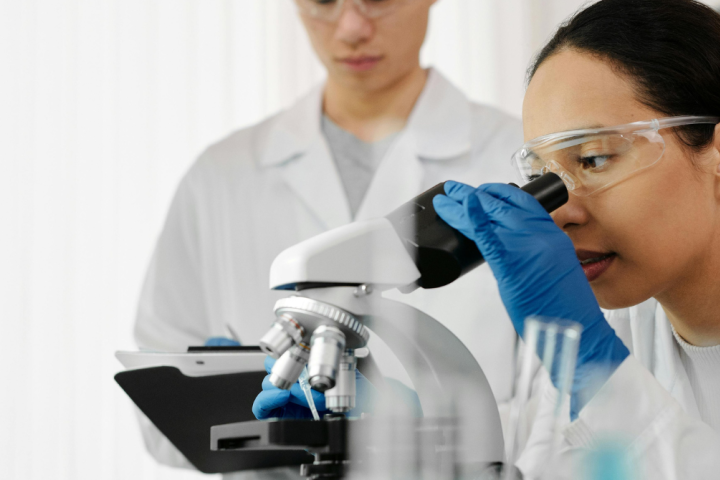News
Customize list
-

Treating wastewater through cavitation and understanding the effects of bubbles on bacterial cells
Increasing environmental pollution and drinking water shortages are a growing socioeconomic problem, in which cavitation technology can contribute to a cleaner and greener approach to wastewater treatment. Cavitation is a physical phenomenon that describes the phase change from liquid to vapour and back at constant temperature. The mechanical, thermal and chemical effects of cavitation can be utilised for various purposes, including to inactivate microorganisms in drinking water and wastewater. It has been proven that cells are subjected to damage in the immediate vicinity of a bubble. Further numerical analysis has identified the formation of microjets as a possible mechanism of bacterial cell damage.
-

Using cavitation to break down invisible water pollutants
Researchers from the Faculty of Mechanical Engineering and the National Institute of Chemistry conducted an experimental study in which they achieved the degradation of a water-soluble synthetic polymer - poly(vinyl alcohol) PVOH - by acoustic and hydrodynamic cavitation. The use of PVOH is rapidly increasing, and as a result, increasing amounts of this material are being released into the environment. PVOH is widely used in the textile and paper industries, as well as in households, for example in the form of detergent pods. It is estimated that thousands of tons of it are washed into the aquatic ecosystem every year.
-

The innovative solutions for the use of flexibility in the power system
The increasing share of renewable distributed energy resources (DERs) in the power system is becoming a key for the decarbonization of the European energy sector and thus achieving the EU's energy and climate change policy objectives. The variability and uncertainty of the DERs generation present significant risks and challenges related to the stability and reliability of the entire interconnected European power system, as well as national and even small local networks while opening new opportunities for the development of new energy concepts and solutions.
-

Biotechnical Faculty and partners free up potential European rural areas for transition to circular bioeconomy
Based at the Biotechnical Faculty of the University of Ljubljana, a new Horizon Europe coordination and support project is underway to develop a working framework for introducing circular small-scale bio-based solutions in rural areas. Assoc. Prof. Dr Luka Juvančič, head of the project at the Biotechnical Faculty in the Chair for Agrarian Economics, Policy Law of the Animal Science Department, explains: “The aim of the BioRural project is to address economic, demographic and climate challenges for the most remote rural communities, through the presentation of circular technological and organisational solutions in various fields of bioeconomy (agricultural and food systems, the forest-wood chain, water systems, bioenergy, biomaterials).” He pointed out that European rural areas should not just succumb to the role of a source of raw materials for the bioeconomy, but should strengthen local value chains that will contribute to increased income and new rural employment.
-

Shocking in the field of pressure metrology
Accurate measurements of time-varying pressure are important to many industrial sectors. The most stringent requirements for accurate high-frequency pressure measurements come from the automotive, aerospace and ballistics industries, where pressure with frequencies up to few hundred kHz must be accurately measured. To provide dynamic calibrations of pressure meters in the required frequency range and therefore enable accurate measurements in the most demanding industries, many national metrology institutes worldwide are developing a primary dynamic measurement standard for pressure based on the shock tube. In the shock tube, the calibrated pressure meter can be excited by an almost ideal pressure step change generated by the reflection of the shock wave from the end wall of the shock tube. Such an extremely rapid reflection of the shock wave, in addition to generating the high-frequency pressure, inevitably also excites unwanted mechanical vibrations, which can produce spurious output signals of the pressure meter being calibrated.
-

Preserving the inflatable Trump baby blimp
Researchers at the Heritage Science Laboratory Ljubljana (HSLL) of the Faculty of Chemistry and Chemical Technology, researchers at University College London (UCL) and conservators at the Museum of London have collaborated in interdisciplinary research in the field of heritage science, studying the stability and risk of displaying the 6-metre high and 3-metre wide polyvinyl chloride (PVC) inflatable. The results of chromatographic analysis of the material, studies of accelerated degradation of model samples and modelling diffusion and evaporation enabled the conservators to assess the environmental risks to the object during storage and exhibitions.
-

Tribological Research on Surfaces and Contacts for Green Mobility
Mobility GT: The largest project at the faculty of mechanical engineering of UL so far – CoFund project of Horizon Europe was awarded the Seal of Excellence, with which Prof. Mitjan Kalin, PhD, who will coordinate a project of 24 postdoctoral research projects worth 7.6 million euros.
